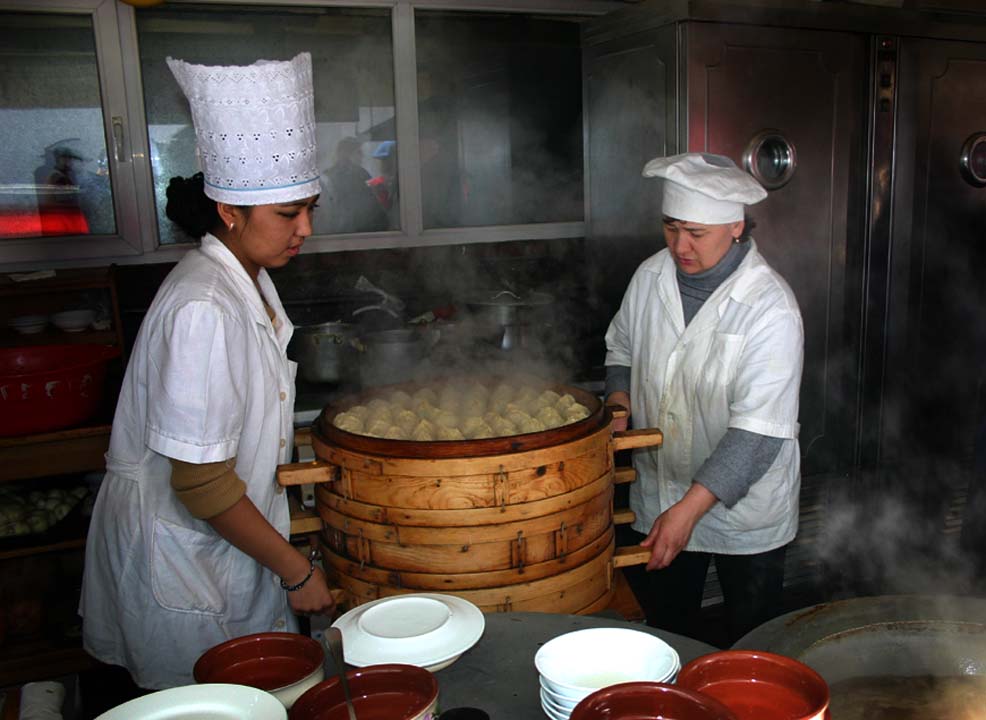|
Aqyn
Akyns, or aqyns ( kk, ақын, ky, акын, ; both transcribed as ''aqın'' or ''اقىن''), are improvising poets and singers in the Kazakh and Kyrgyz cultures. Akyns differ from the or , who are song performers or epic storytellers. In song competitions known as aytıs, akyns improvise in the form of a song-like recitative, usually to the accompaniment of a dombra (among Kazakhs) or a komuz (among Kyrgyz). In the context of the nomadic lifestyle and illiteracy of most of the rural population in Central Asia in pre-Soviet times, akyns played an important role in terms of expressing people's thoughts and feelings, exposing social vices, and glorifying heroes. In the Soviet era, their repertoire incorporated praise songs to Lenin. Modern akyns may also publish their original lyrics and poetry. Akyn Kazakhstan Famous Kazakh Akynes: Zhanak Kambaruluy (1760-1857), Mahambet Utemsov (1804-1846), Suunbai Aronewa (1815-1898), Shernyz Zharylgasov (1817-1881), Birzhan-Sal Khodgulov ... [...More Info...] [...Related Items...] OR: [Wikipedia] [Google] [Baidu] |
Illiteracy
Literacy in its broadest sense describes "particular ways of thinking about and doing reading and writing" with the purpose of understanding or expressing thoughts or ideas in Writing, written form in some specific context of use. In other words, humans in literate societies have sets of Social practice, practices for producing and consuming writing, and they also have Social representation, beliefs about these practices. Reading, in this view, is always reading something for some purpose; writing is always writing something for someone for some particular ends. Beliefs about reading and writing and its value for society and for the individual always influence the ways literacy is taught, learned, and practiced over the lifespan. Some researchers suggest that the history of interest in the concept of "literacy" can be divided into two periods. Firstly is the period before 1950, when literacy was understood solely as alphabetical literacy (word and letter recognition). Secondly ... [...More Info...] [...Related Items...] OR: [Wikipedia] [Google] [Baidu] |
Bashkir Folklore
Bashkir may refer to: *Bashkirs, an ethnic group in Russia *Bashkir language, a Turkic language spoken by the Bashkirs *A citizen of Bashkortostan *The (American) Bashkir Curly or Curly Horse, a curly-coated American horse breed *The Bashkir horse, a horse breed from Bashkortostan in the Russian Federation *Stefan Bashkir, a character in Eoin Colfer's novel ''The Supernaturalist'' *The V'ornn name for their merchant class, in Eric Van Lustbader's '' Pearl Saga'' See also *Bashkir State University *Bashkiria (other) Bashkiria may refer to: *Republic of Bashkortostan, a federal subject of Russia *Bashkir Autonomous Soviet Socialist Republic (1919–1992), an administrative division of the Russian SFSR, Soviet Union * ''Bashkiria'' (brachiopod), a genus of Brachi ... {{Disambig Language and nationality disambiguation pages ... [...More Info...] [...Related Items...] OR: [Wikipedia] [Google] [Baidu] |
Masterpieces Of The Oral And Intangible Heritage Of Humanity
The Proclamation of Masterpieces of the Oral and Intangible Heritage of Humanity was made by the Director-General of UNESCO starting in 2001 to raise awareness of intangible cultural heritage and encourage local communities to protect them and the local people who sustain these forms of cultural expressions. Several manifestations of intangible heritage around the world were awarded the title of ''Masterpieces'' to recognize the value of the non-material component of culture, as well as entail the commitment of states to promote and safeguard the Masterpieces. Further proclamations occurred biennially. In 2008, the 90 previously proclaimed Masterpieces were incorporated into the new Representative List of the Intangible Cultural Heritage of Humanity as its first entries. Background UNESCO defines oral and intangible heritage as "the totality of tradition-based creations of a cultural community expressed by a group or individuals and recognized as reflecting the expectations of a ... [...More Info...] [...Related Items...] OR: [Wikipedia] [Google] [Baidu] |
Kazakhstani Culture
Kazakhstan has a well-articulated culture based on the nomadic pastoral economy of the inhabitants. Islam was introduced to Kazakhstan in the 7th to 12th centuries. Besides lamb, many other traditional foods retain symbolic value. Kazakh culture is largely influenced by the Turkic nomadic lifestyle. It also seems to be strongly influenced by the nomadic Scythians. Because animal husbandry was central to the Kazakhs' traditional lifestyle, most of their nomadic practices and customs relate in some way to livestock. Traditional curses and blessings invoked disease or fertility among animals, and good manners required that a person ask first about the health of a man's livestock when greeting him and only afterward inquire about the human aspects of his life. The traditional Kazakh dwelling is the ''yurt'', a tent consisting of a flexible framework of willow wood covered with varying thicknesses of felt. The open top permits smoke from the central hearth to escape; temperature and d ... [...More Info...] [...Related Items...] OR: [Wikipedia] [Google] [Baidu] |
Kyrgyz Music
Kyrgyz music is nomadic and rural, and is closely related to Turkmen and Kazakh folk forms. Kyrgyz folk music is characterized by the use of long, sustained pitches, with Russian elements also prominent. Traditional music Travelling musicians and shamans called manaschi are popular for their singing and komuz-playing. Their music is typically heroic epics, such as the most famous story, the ''Manas epic'' (20 times longer than Homer's Odyssey), which is the patriotic tale of a warrior named Manas, and his descendants, who fight with the Chinese.Broughton, Simon and Sultanova, Razia. "Bards of the Golden Road". 2000. In Broughton, Simon and Ellingham, Mark with McConnachie, James and Duane, Orla (Ed.), ''World Music, Vol. 2: Latin & North America, Caribbean, India, Asia and Pacific'', pp 24-31. Rough Guides Ltd, Penguin Books. There are modern reciters of the ''Manas'' who are very popular, such as Rysbek Jumabaev and Sayaqbay Karalaev. Aside from the komuz, Kyrgyz folk inst ... [...More Info...] [...Related Items...] OR: [Wikipedia] [Google] [Baidu] |
Kazakh Music
Music of Kazakhstan refers to a wide range of musical styles and genres deriving from Kazakhstan. Kazakhstan is home to the Kazakh State Kurmangazy Orchestra of Folk Instruments, the Kazakh State Philharmonic Orchestra, the Kazakh National Opera and the Kazakh State Chamber Orchestra. The folk instrument orchestra was named after Kurmangazy Sagyrbayuly, a well-known composer and dombra player from the 19th century. Traditional music Traditional music in Kazakhstan often refers to music of the following genres: * Instrumental music, with the pieces ("Küy") being performed by soloists. Text is often seen in the background (or "program") for the music, as a lot of Küy titles refer to stories. * Vocal music, either as part of a ceremony such as a wedding (mainly performed by women), or as part of a feast. Here we might divide into subgenres: epic singing, containing not only historical facts, but as well the tribe's genealogy, love songs, didactic verses; and as a special form the ... [...More Info...] [...Related Items...] OR: [Wikipedia] [Google] [Baidu] |
Vladimir Lenin
Vladimir Ilyich Ulyanov. ( 1870 – 21 January 1924), better known as Vladimir Lenin,. was a Russian revolutionary, politician, and political theorist. He served as the first and founding head of government of Soviet Russia from 1917 to 1924 and of the Soviet Union from 1922 to 1924. Under his administration, Russia, and later the Soviet Union, became a one-party socialist state governed by the Communist Party. Ideologically a Marxist, his developments to the ideology are called Leninism. Born to an upper-middle-class family in Simbirsk, Lenin embraced revolutionary socialist politics following his brother's 1887 execution. Expelled from Kazan Imperial University for participating in protests against the Russian Empire's Tsarist government, he devoted the following years to a law degree. He moved to Saint Petersburg in 1893 and became a senior Marxist activist. In 1897, he was arrested for sedition and exiled to Shushenskoye in Siberia for three years, where he m ... [...More Info...] [...Related Items...] OR: [Wikipedia] [Google] [Baidu] |
Soviet Union
The Soviet Union,. officially the Union of Soviet Socialist Republics. (USSR),. was a List of former transcontinental countries#Since 1700, transcontinental country that spanned much of Eurasia from 1922 to 1991. A flagship communist state, it was nominally a Federation, federal union of Republics of the Soviet Union, fifteen national republics; in practice, both Government of the Soviet Union, its government and Economy of the Soviet Union, its economy were highly Soviet-type economic planning, centralized until its final years. It was a one-party state governed by the Communist Party of the Soviet Union, with the city of Moscow serving as its capital as well as that of its largest and most populous republic: the Russian Soviet Federative Socialist Republic, Russian SFSR. Other major cities included Saint Petersburg, Leningrad (Russian SFSR), Kyiv, Kiev (Ukrainian Soviet Socialist Republic, Ukrainian SSR), Minsk (Byelorussian Soviet Socialist Republic, Byelorussian SSR), Tas ... [...More Info...] [...Related Items...] OR: [Wikipedia] [Google] [Baidu] |
Central Asia
Central Asia, also known as Middle Asia, is a region of Asia that stretches from the Caspian Sea in the west to western China and Mongolia in the east, and from Afghanistan and Iran in the south to Russia in the north. It includes the former Soviet republics of Kazakhstan, Kyrgyzstan, Tajikistan, Turkmenistan, and Uzbekistan, which are colloquially referred to as the "-stans" as the countries all have names ending with the Persian suffix " -stan", meaning "land of". The current geographical location of Central Asia was formerly part of the historic region of Turkistan, also known as Turan. In the pre-Islamic and early Islamic eras ( and earlier) Central Asia was inhabited predominantly by Iranian peoples, populated by Eastern Iranian-speaking Bactrians, Sogdians, Chorasmians and the semi-nomadic Scythians and Dahae. After expansion by Turkic peoples, Central Asia also became the homeland for the Kazakhs, Uzbeks, Tatars, Turkmen, Kyrgyz, and Uyghurs; Turkic langua ... [...More Info...] [...Related Items...] OR: [Wikipedia] [Google] [Baidu] |




.png)